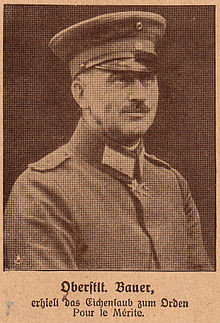- Max Bauer
-
This article is about the military adviser and artillery expert. For the professional wrestler, see Max Bauer (wrestler).
Max Hermann Bauer (January 31, 1869 in Quedlinburg – May 6, 1929 in Shanghai) was a German artillery expert in the First World War and later military and industrial advisor to the Kuomintang.
He joined the German Army in 1890 and in 1905 was appointed to the general staff.[1] He became expert in artillery tactics and during the First World War had a hand in destroying the Liège fort in Belgium in 1914. In July 1915 he became a chief of the Section I of the General staff. He mobilized industry to produce ammunition and wrote a booklet about defensive tactics. In December 1916 he was awarded the Pour le Mérite, with oak leaves added on March 28, 1918.
After the war, Bauer participated in the Kapp Putsch in 1920. When that failed, he was exiled and later worked as a military consultant in the Soviet Union, Spain and Argentina. He returned to Germany in 1925 after general amnesty for those had been involved with the putsch.
In 1926, Chinese engineer Chu Chia-hua, president of the Sun Yat-Sen University in Canton, contacted then-colonel Bauer to advise in military and business opportunities in China. Next year Bauer visited Chiang Kai-Shek, who hired him as a military advisor, wishing to use his contacts to acquire more weapons and industrial assistance from Germany.
In 1928 Bauer returned to Germany to form contacts with German industries and the army. However, the Treaty of Versailles had made military production hard to organise. In addition, he was a persona non grata to the German government as he had participated in the Kapp Putsch. Bauer still created the China trade department and formed contacts with the secret German military mission in Nanking.
When Bauer returned to China, he advocated formation of small core army and many local militia forces. Chiang Kai-Shek did not use these ideas, since local militia would have meant the concentration of military power in local hands. However, Bauer did manage to have the Whampoa Military Academy moved from Guangzhou to Nanking[1] where it became the Central Military Academy and staff it with German military advisors and instructors. He invited 20 German officers to China to work as instructors in military training and military intelligence. Officially he was Chiang's economic adviser and he did encourage him to develop infrastructure.
Max Bauer died of smallpox on May 6, 1929. Bauer might have been intentionally infected by one of his Chinese enemies[1], as he was the only person infected with the contagious disease in the region where he contracted it. He was buried in China with military honors[1].
See also
- Sino-German cooperation
- German-trained divisions of the National Revolutionary Army
External links
References
Categories:- 1875 births
- 1929 deaths
- Deaths from smallpox
- German military personnel of World War I
- Infectious disease deaths in China
Wikimedia Foundation. 2010.

